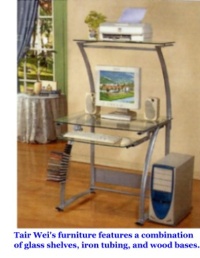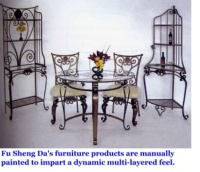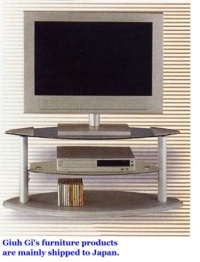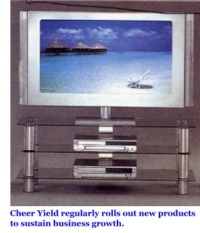Glass-Metal Furniture Taiwanese Makers Retain Global Edge
Mar 24, 2006 Ι Industry News Ι Furniture Ι By Philip, CENS
Despite the steep appreciation of the New Taiwan dollar and rising material costs, Taiwan's glass-metal furniture makers still manage to maintain decent profit margins thanks to the attractive designs, extraordinary quality and quality materials of their products.
In addition to the designs offered by their OEM (original equipment manufacturing) clients, Taiwanese makers in the line have steadily rolled out new designs of their own creation for customers to select from.
One design feature of Taiwan-made glass-metal furniture is the use of combination materials, which, in addition to glass and iron, also include aluminum, copper, wood, and poly resin. Production for such furniture with combination materials has been made possible due to the clustering of related supporting factories, mainly in the central Taiwan counties of Taichung and Changhua.
Due to the support of competent electroplating plants, Taiwan-made glass-metal furniture boasts metal parts with superior and long-lasting electroplated surface treatment. A new development is the application of satin-electroplating technology, which can produce a soft and graceful electroplated surface.
A new offering from metal-tube suppliers is tubes in the shape of eyes. This material has been adopted by many furniture makers in Taiwan.
Taiwan-made glass-metal furniture enjoys an additional edge from the domestic supply of low-cost quality materials, mainly iron and glass. Consequently, many Taiwanese furniture makers in mainland China still source iron from China Steel in Taiwan.
Eye on Design
Tair Wei Enterprise, for instance, plans to carry out vigorous promotion of its glass-metal furniture series, featuring eye-shape tubes. The series includes dining table sets, computer tables, and coffee tables. The use of eye-shape tubes gives these furniture products a simple and streamlined appearance.
Most such tubes feature baked enamel coating, but electroplated versions are also available.
Most of the company's products utilize the combination materials of glass, iron, and wood (mostly for base).
The company introduces about 10 new models each year, one third of which are provided to OEM clients and the remainder based on its own original designs. The U.S. absorbs 70% to 80% of the company's output and the remainder is shipped to Germany and some Southeast Asian nations.
Julie Lin, deputy manager, notes that the company plans to vigorously promote the eye-shape tube furniture products this year, as its existing products have gradually lost their luster, leading to lower profit margins. The company's factory is located in Taichung county, which now employs 40 to 50 workers.
Combining Forces
Fu Sheng Da also offers furniture products made of combination materials, which, in addition to glass and iron tubes, include aluminum, copper and poly resin. For instance, the company uses poly resin on the bases of its table to give them a sculptured tree feel.
The company mainly produces dining tables, coffee tables, and dressers; it now has 40 models on offer. Designs for half of the models are created by the company's in-house designers and the other half provided by its OEM clients. The company typically spends NT$3 million (around US$93, 000, at US$1:NT$32) on the development of new models every year. Its furniture products feature classical designs and some models have a modernistic touch. Its products are all manually painted, a treatment that gives off a lively multi-layer feel.
The U.S. market absorbs 60% of the company's output, with the remainder being shipped to the European market, mainly the United Kingdom. In the U.S., major sales outlets are furniture store chains and department stores, such as J.C. Penney, while in Europe, major outlets are department stores. The U.S. prefers metal parts in various colors, such as black, gold, and silver, while the U.K. market favors such parts in cream color. This year, the company intends to introduce several new models to tap the Middle East market.
The company makes its products at a factory in Dongguan, Guangdong Province, which employs 300 workers. The factory has become highly localized, with all the managerial posts filled by native mainlanders. There is only one Taiwanese manager supervising the mainland operation: company chairman Tsou Fu-tsung. The company still maintains a Taiwan office mainly to handle design and marketing operations.
Simplicity and Grace
Giuh Gi Metal offers TV stands, notebook TV stands, and bar tables made with glass shelves, iron frames, and wood bases, all made with simple, graceful, and practical designs. The company uses iron tubes in oval, square, and eye shapes. In addition to baked-enamel coating and chrome coating, satin electroplating treatment is also applied, creating a soft and frosted surface.
To assure the solidity of the structure, the glass is subject to a pulling test and the iron frames undergo load testing before production. The company's notebook PC stands are furnished with casters.
Eighty percent of the company's output is shipped to Japan, mainly via big trading firms, where they are mostly displayed at specialized electronic-product stores. As a result, the company's products often carry certain Japanese flavor. Products destined for the U.S. and European markets, therefore, are usually modified before shipment.
Aluminum Appeal
Cheer Yield Enterprise Co., Ltd. Began making glass-aluminum frame furniture products in order to reinvigorate its slackening business, as market for its glass-iron frame furniture has gradually waned. The aluminum-frame series includes TV stands, dining tables, and display shelves. The company uses imported aluminum tubes to reduce cost and then does the surface treatment processing in Taiwan. The tubes are used in K/D (knock/down) products, many of them with patented designs. The aluminum products give off a touch of moderation and a sense of quality. The market reception for these products has been satisfactory since their rollout in late 2005. The company will formally debut the products at the International Furniture Fair in Singapore in March.
The launch of the aluminum models is expected to give a strong boost to the company's business, which stumbled 30% last year. In fact, the development of new products has been the company's long-standing policy in the effort to sustain its business growth. Typically, the company presents four new or modified models every month. A noticeable new addition to its product line is a TV stand with a top that can be lifted or lowered by a remote control for conversion into a common display shelf.
Cheer Yield's major markets are Germany (30%), Japan (30%), and Australia (20%), where they are sold mainly via electronics retailers and specialized furniture stores. Luke Yang, chairman, notes that the company's products have no problem meeting the new environment requirements of the European Union, since they are all earth-friendly. The company' factory, in Changhua County, central Taiwan, now employs 40 workers. (Jan. 2006)
In addition to the designs offered by their OEM (original equipment manufacturing) clients, Taiwanese makers in the line have steadily rolled out new designs of their own creation for customers to select from.
One design feature of Taiwan-made glass-metal furniture is the use of combination materials, which, in addition to glass and iron, also include aluminum, copper, wood, and poly resin. Production for such furniture with combination materials has been made possible due to the clustering of related supporting factories, mainly in the central Taiwan counties of Taichung and Changhua.
Due to the support of competent electroplating plants, Taiwan-made glass-metal furniture boasts metal parts with superior and long-lasting electroplated surface treatment. A new development is the application of satin-electroplating technology, which can produce a soft and graceful electroplated surface.
A new offering from metal-tube suppliers is tubes in the shape of eyes. This material has been adopted by many furniture makers in Taiwan.
Taiwan-made glass-metal furniture enjoys an additional edge from the domestic supply of low-cost quality materials, mainly iron and glass. Consequently, many Taiwanese furniture makers in mainland China still source iron from China Steel in Taiwan.
Eye on Design
Tair Wei Enterprise, for instance, plans to carry out vigorous promotion of its glass-metal furniture series, featuring eye-shape tubes. The series includes dining table sets, computer tables, and coffee tables. The use of eye-shape tubes gives these furniture products a simple and streamlined appearance.
Most such tubes feature baked enamel coating, but electroplated versions are also available.
Most of the company's products utilize the combination materials of glass, iron, and wood (mostly for base).
The company introduces about 10 new models each year, one third of which are provided to OEM clients and the remainder based on its own original designs. The U.S. absorbs 70% to 80% of the company's output and the remainder is shipped to Germany and some Southeast Asian nations.
Julie Lin, deputy manager, notes that the company plans to vigorously promote the eye-shape tube furniture products this year, as its existing products have gradually lost their luster, leading to lower profit margins. The company's factory is located in Taichung county, which now employs 40 to 50 workers.
Combining Forces
Fu Sheng Da also offers furniture products made of combination materials, which, in addition to glass and iron tubes, include aluminum, copper and poly resin. For instance, the company uses poly resin on the bases of its table to give them a sculptured tree feel.
The company mainly produces dining tables, coffee tables, and dressers; it now has 40 models on offer. Designs for half of the models are created by the company's in-house designers and the other half provided by its OEM clients. The company typically spends NT$3 million (around US$93, 000, at US$1:NT$32) on the development of new models every year. Its furniture products feature classical designs and some models have a modernistic touch. Its products are all manually painted, a treatment that gives off a lively multi-layer feel.
The U.S. market absorbs 60% of the company's output, with the remainder being shipped to the European market, mainly the United Kingdom. In the U.S., major sales outlets are furniture store chains and department stores, such as J.C. Penney, while in Europe, major outlets are department stores. The U.S. prefers metal parts in various colors, such as black, gold, and silver, while the U.K. market favors such parts in cream color. This year, the company intends to introduce several new models to tap the Middle East market.
The company makes its products at a factory in Dongguan, Guangdong Province, which employs 300 workers. The factory has become highly localized, with all the managerial posts filled by native mainlanders. There is only one Taiwanese manager supervising the mainland operation: company chairman Tsou Fu-tsung. The company still maintains a Taiwan office mainly to handle design and marketing operations.
Simplicity and Grace
Giuh Gi Metal offers TV stands, notebook TV stands, and bar tables made with glass shelves, iron frames, and wood bases, all made with simple, graceful, and practical designs. The company uses iron tubes in oval, square, and eye shapes. In addition to baked-enamel coating and chrome coating, satin electroplating treatment is also applied, creating a soft and frosted surface.
To assure the solidity of the structure, the glass is subject to a pulling test and the iron frames undergo load testing before production. The company's notebook PC stands are furnished with casters.
Eighty percent of the company's output is shipped to Japan, mainly via big trading firms, where they are mostly displayed at specialized electronic-product stores. As a result, the company's products often carry certain Japanese flavor. Products destined for the U.S. and European markets, therefore, are usually modified before shipment.
Aluminum Appeal
Cheer Yield Enterprise Co., Ltd. Began making glass-aluminum frame furniture products in order to reinvigorate its slackening business, as market for its glass-iron frame furniture has gradually waned. The aluminum-frame series includes TV stands, dining tables, and display shelves. The company uses imported aluminum tubes to reduce cost and then does the surface treatment processing in Taiwan. The tubes are used in K/D (knock/down) products, many of them with patented designs. The aluminum products give off a touch of moderation and a sense of quality. The market reception for these products has been satisfactory since their rollout in late 2005. The company will formally debut the products at the International Furniture Fair in Singapore in March.
The launch of the aluminum models is expected to give a strong boost to the company's business, which stumbled 30% last year. In fact, the development of new products has been the company's long-standing policy in the effort to sustain its business growth. Typically, the company presents four new or modified models every month. A noticeable new addition to its product line is a TV stand with a top that can be lifted or lowered by a remote control for conversion into a common display shelf.
Cheer Yield's major markets are Germany (30%), Japan (30%), and Australia (20%), where they are sold mainly via electronics retailers and specialized furniture stores. Luke Yang, chairman, notes that the company's products have no problem meeting the new environment requirements of the European Union, since they are all earth-friendly. The company' factory, in Changhua County, central Taiwan, now employs 40 workers. (Jan. 2006)
©1995-2006 Copyright China Economic News Service All Rights Reserved.









